For Colored Girls Who Have Considered Suicide When the Rainbow is Enuf
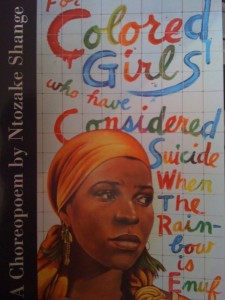 On this page you will find announcements, articles, reviews and profiles of Theatre Conspiracy’s For Colored Girls Who Considered Suicide When the Rainbow is Enuf, a groundbreaking “choreopoem” that features a spellbinding collection of vivid prose and free verse narratives about and performed by Black women. Capturing the brutal, tender and dramatic lives of contemporary Black women, For Colored Girls… offers a transformative, riveting evening of provocative dance, music and poetry. Winner of the 1977 Obie Award for Distinguished Production, Ntozake Shange’s For Colored Girls … will be performed by Theatre Conspiracy at Florida SouthWestern State College on January 29, 30 and 31 and February 5, 6 and 7 at 8 p.m., as well as 2 p.m. matinee performances on January 31 and February 7. Individual tickets are $22 each. Student tickets are $11. Thursdays are “buy one get one half off”, Opening night Jan. 29 is “pay what you will”, you name the ticket price! Tickets can be purchased by calling Theatre Conspiracy’s box office at 239-936-3239 or by visiting www.theatreconspiracy.org.
On this page you will find announcements, articles, reviews and profiles of Theatre Conspiracy’s For Colored Girls Who Considered Suicide When the Rainbow is Enuf, a groundbreaking “choreopoem” that features a spellbinding collection of vivid prose and free verse narratives about and performed by Black women. Capturing the brutal, tender and dramatic lives of contemporary Black women, For Colored Girls… offers a transformative, riveting evening of provocative dance, music and poetry. Winner of the 1977 Obie Award for Distinguished Production, Ntozake Shange’s For Colored Girls … will be performed by Theatre Conspiracy at Florida SouthWestern State College on January 29, 30 and 31 and February 5, 6 and 7 at 8 p.m., as well as 2 p.m. matinee performances on January 31 and February 7. Individual tickets are $22 each. Student tickets are $11. Thursdays are “buy one get one half off”, Opening night Jan. 29 is “pay what you will”, you name the ticket price! Tickets can be purchased by calling Theatre Conspiracy’s box office at 239-936-3239 or by visiting www.theatreconspiracy.org.
* * * * * * * * * * * * * * * * * * * * * * * * * * * * * * * * * * * * * * * * * *
Meet the ‘For Colored Girls’ cast (02-04-15)
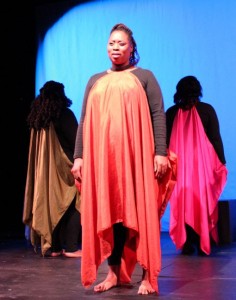 For Colored Girls Who Have Considered Suicide When the Rainbow is Enuf continues at the FSW State College’s Black Box Theatre tomorrow through Saturday. It is performed by eight eager, energetic and equally talented actors who are differentiated in the play through only the color of their costumes.
For Colored Girls Who Have Considered Suicide When the Rainbow is Enuf continues at the FSW State College’s Black Box Theatre tomorrow through Saturday. It is performed by eight eager, energetic and equally talented actors who are differentiated in the play through only the color of their costumes.
Sonya McCarter is the Lady in Orange. A Fort Myers native, wife and mother of three, Sonya has been heavily involved with community theater over the years and was most recently in Naples Players’ productions of Doubt, A Parable (as Mrs. Muller) and Good People (as Kate).
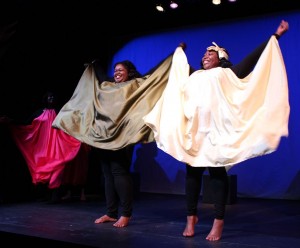 Cantrella Canady is the Lady in Green. This Fort Myers native may be a rookie to the world of theater, but it’s a sure bet we’ll be seeing more of her in the future. Cantrella is currently pursuing her Bachelor of Arts in Communication with a minor in Theater at Florida Gulf Coast University. She also currently co-hosts Destiny Radio Talk Show and is a member of the Gospel Jams Radio Show, Jam Crew. Her love of acting has inspired
Cantrella Canady is the Lady in Green. This Fort Myers native may be a rookie to the world of theater, but it’s a sure bet we’ll be seeing more of her in the future. Cantrella is currently pursuing her Bachelor of Arts in Communication with a minor in Theater at Florida Gulf Coast University. She also currently co-hosts Destiny Radio Talk Show and is a member of the Gospel Jams Radio Show, Jam Crew. Her love of acting has inspired 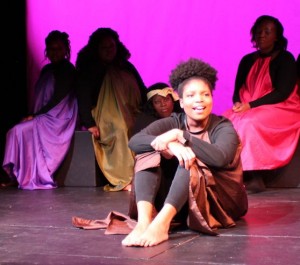 her to perform in several community theater productions and web skits.
her to perform in several community theater productions and web skits.
Paige Dawkins is the Lady in Brown. Currently a student at Florida SouthWestern State College, Paige is studying theatre performance. She recently appeared as Mary Baltimore in FSW’s fall show, On the Verge by Eric Overmeyer. She is a graduate of the Mississippi School of the Arts and after she completes her sophomore year at Florida 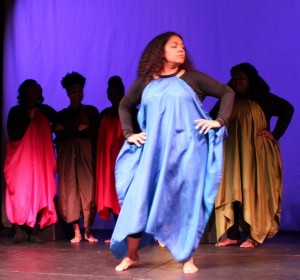 SouthWestern, she plans to pursue a BFA in Performance at a 4-year school.
SouthWestern, she plans to pursue a BFA in Performance at a 4-year school.
Monica De La Torre is the Lady in Blue. A nuclear medicine technologist, Monica has been acting for a number of years. She has performed locally in community theater, her Christian Life Fellowship church and has done a lot of Improv. She is currently signed with Premier Model and Talent in Jacksonville, Florida. You will love, love, love her saucy Latino riff and fluid movements as she 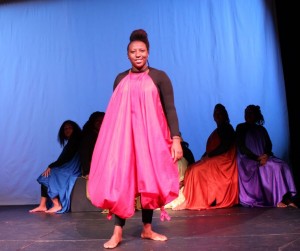 dances across the stage.
dances across the stage.
Anna Delevoe is the Lady in Pink. Anna has been on and off stage for many years. She loves performing and For Colored Girls is a play she has always loved and hoped to perform in.
Carolyn Greene is the Lady in Purple. This lively Caribbean native began in community theater five years ago in a production of the Vagina Monologues. She is a member of a 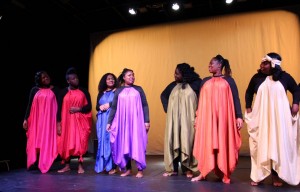 local choir and a mentor to college-age women, a Phoenix who has risen from the ashes to meet every challenge.
local choir and a mentor to college-age women, a Phoenix who has risen from the ashes to meet every challenge.
Chejai Onumbu is the Lady in Red. While born in Marietta, Georgia, Chejai spent most of her childhood in Lagos Nigeria. She is currently a student at Florida SouthWestern, where she is 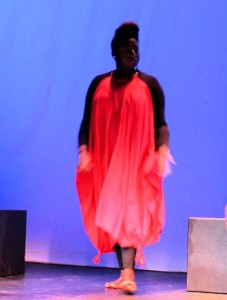 double majoring in Theatre and Communications. Chejai aspires to write and direct in film and theater and to learn and absorb culture and customs around the world through extensive travels.
double majoring in Theatre and Communications. Chejai aspires to write and direct in film and theater and to learn and absorb culture and customs around the world through extensive travels.
Malissa Sanon is the Lady in Yellow. This Fort Lauderdale native aspires to become a mental health counsellor. Although you’ll swear she is an acting veteran, For Colored Girls is actually her debut production.
Please see above for remaining play dates, times and ticket information. And read on for reviews of the production and profiles of the playwright, director and assistant director of the play.
___________________________________________________________________________
‘Colored Girls’ illuminating, cathartic and ultimately uplifting … at least for women (02-02-15)
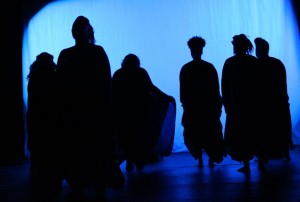 Playing now through February 7 at the Black Box Theatre on the Lee campus of Florida SouthWestern State College is For Colored Girls Who Considered Suicide When the Rainbow is Enuf. It starts out innocuously enough, with the cast members’ playful exuberance eliciting broad, toothy smiles and demure grins from the audience. But suddenly, abruptly, we realize that we are no
Playing now through February 7 at the Black Box Theatre on the Lee campus of Florida SouthWestern State College is For Colored Girls Who Considered Suicide When the Rainbow is Enuf. It starts out innocuously enough, with the cast members’ playful exuberance eliciting broad, toothy smiles and demure grins from the audience. But suddenly, abruptly, we realize that we are no 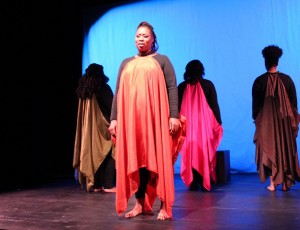 longer watching a troupe of passionate thespians dancing and gliding barefoot across the painted black plywood stage a scant few feet away. Before our startled, sometimes shuttered eyes, they morph into eight wizened women whose disparately sad and shocking stories catapult us through every conceivable emotion that a woman can experience. And as we experience for ourselves their joy and laughter, their rage and anger, their
longer watching a troupe of passionate thespians dancing and gliding barefoot across the painted black plywood stage a scant few feet away. Before our startled, sometimes shuttered eyes, they morph into eight wizened women whose disparately sad and shocking stories catapult us through every conceivable emotion that a woman can experience. And as we experience for ourselves their joy and laughter, their rage and anger, their 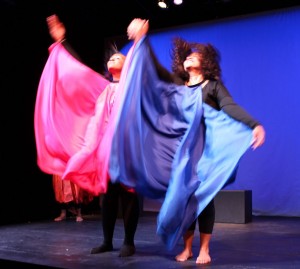 sorrow and soul-shattering grief, the sallow smiles fade from our quivering lips, to be replaced by slack-jawed commiseration with all that they lay bare at our unclean feet.
sorrow and soul-shattering grief, the sallow smiles fade from our quivering lips, to be replaced by slack-jawed commiseration with all that they lay bare at our unclean feet.
Colored Girls is not light fare. It is a raw, meaty meal that is hard to watch, never mind digest. But it is experienced in vastly different ways, not by blacks, whites and Latinos, but by men versus women.
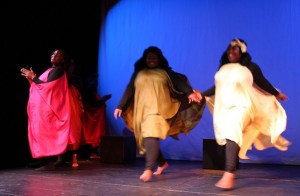 From the female perspective , it is illuminating (as in “Ah, so I’m not the only one who’s gone through that”), cathartic and ultimately uplifting as the choreopoem attests to the fact that in spite of suffering abandonment, betrayal, abuse and unspeakable violence at the hands of the men who enter their lives, women are survivors. By turning
From the female perspective , it is illuminating (as in “Ah, so I’m not the only one who’s gone through that”), cathartic and ultimately uplifting as the choreopoem attests to the fact that in spite of suffering abandonment, betrayal, abuse and unspeakable violence at the hands of the men who enter their lives, women are survivors. By turning 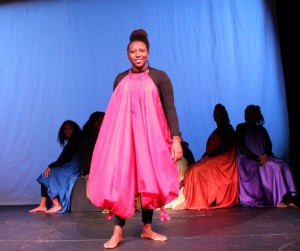 to their circle of friends for understanding and support (a’ la Sex in the City), there exists the promise of a better tomorrow that includes the love and respect they crave and deserve.
to their circle of friends for understanding and support (a’ la Sex in the City), there exists the promise of a better tomorrow that includes the love and respect they crave and deserve.
It’s a different outcome for male viewers. As the evening meteorically grows in dramatic power and intensity, men find themselves going from uncomfortable seat squirming to head-ducking chagrin, shame and abject disgust. Okay, so maybe 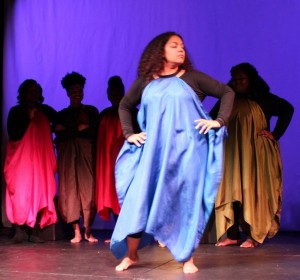 (hopefully) he has never forced himself on a woman, drugged a date or taken advantage of a girl who’d had way too much to drink. But has he laughed as a friend, a co-worker, a teammate related a randy “escapade” in which they did … or worse, become aroused at the thought of it? Perhaps he’s never punched, kicked or slapped his wife or girlfriend a’ la Ray Rice, but has he put his fist or foot through a wall or door or smashed a chair instead … or denigrated her to buoy himself
(hopefully) he has never forced himself on a woman, drugged a date or taken advantage of a girl who’d had way too much to drink. But has he laughed as a friend, a co-worker, a teammate related a randy “escapade” in which they did … or worse, become aroused at the thought of it? Perhaps he’s never punched, kicked or slapped his wife or girlfriend a’ la Ray Rice, but has he put his fist or foot through a wall or door or smashed a chair instead … or denigrated her to buoy himself 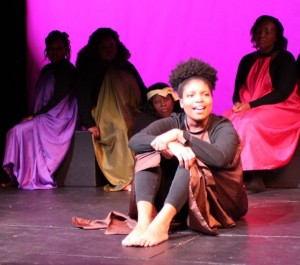 and his fragile ego at her expense? And name me a man who hasn’t had an all-too-facile “I’m sorry” tumble from his insincere lips with the entitled expectation that his grateful girl will immediately excuse his latest transgression no matter how severe the affront to her dignity or self-worth?
and his fragile ego at her expense? And name me a man who hasn’t had an all-too-facile “I’m sorry” tumble from his insincere lips with the entitled expectation that his grateful girl will immediately excuse his latest transgression no matter how severe the affront to her dignity or self-worth?
It’s reminiscent of that episode of Two and a Half Men where Charlie’s mom laments on the balcony of his Malibu beach house, “Did I mean so little that he didn’t even have the decency to call and let 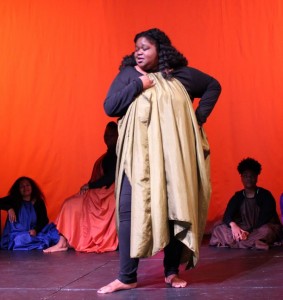 me know it was over?,” giving her philandering son the opportunity to see first-hand what his own serial conquests experienced when he didn’t call or return their calls after he’d gotten what he wanted from them.
me know it was over?,” giving her philandering son the opportunity to see first-hand what his own serial conquests experienced when he didn’t call or return their calls after he’d gotten what he wanted from them.
Of course, that’s precisely the point of Colored Girls. The riffs, outbursts and intensely honest rants of Ntozake Shange’s characters are designed to make both sexes think hard about what they do, how they act and what they are willing to accept from each other in the name of love and lust. By that measure, Colored 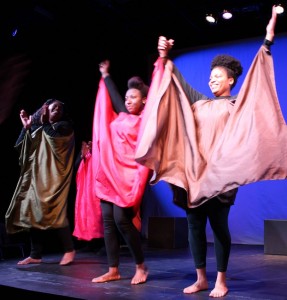 Girls represents community theater at its very best. It is thought-provoking, a conversation starter, and even potentially transformative. And there is something for everyone brave enough and introspective enough to take in this show.
Girls represents community theater at its very best. It is thought-provoking, a conversation starter, and even potentially transformative. And there is something for everyone brave enough and introspective enough to take in this show.
“Unless you’ve lived your entire life in an igloo in the Arctic, you have experienced some, if not most, of the emotions, issues and scenarios included in this production,” observes Assistant Director and Stage Manager Marcus Colon. “That’s why it hits so hard. That’s why it hits home.”
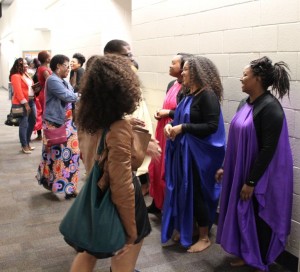 Hits like a sledgehammer that is.
Hits like a sledgehammer that is.
So, if you’re a guy who thinks men are better ….. (drivers, bosses, politicians, leaders, you pick the noun) or are a woman who is involved with a man who thinks this way, go see For Colored Girls Who Considered Suicide When the Rainbow is Enuf. If you’ve largely left unexamined how you relate to the opposite sex as an interpersonal, philosophical or socio-political proposition, go see Colored Girls. There are myriad reasons to go see 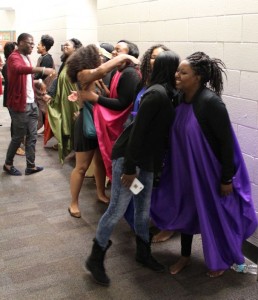 this production. But perhaps the purest and least pretentious is if you love energetic, spirited acting and serious dramatic theater, go see Colored Girls. Because by the latter standard, Colored Girls and its cast of eight earnest and talented actors are a hit.
this production. But perhaps the purest and least pretentious is if you love energetic, spirited acting and serious dramatic theater, go see Colored Girls. Because by the latter standard, Colored Girls and its cast of eight earnest and talented actors are a hit.
But ladies, have some compassion. Take your man for an ice cream cone afterwards. He may need some sweet comfort food following the show, know what I mean?
See above for remaining show dates, times and ticket information.
___________________________________________________________________________
‘Colored Girls’ Patricia Idlette, Marcus Colon and Theatre Conspiracy Artistic Director Bill Taylor featured on WGCU (01-30-15)
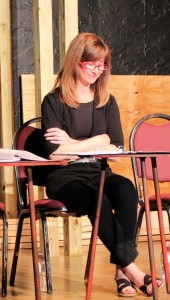 WGCU featured For Colored Girls Who Have Considered Suicide When the Rainbow is Enuf on a 5:12 minute segment yesterday morning. During the feature, Amy Tardiff interviewed actress Sonya McCarter, director Patricia Idlette, assistant director and stage manager Marcus Colon and Theatre Conspiracy Producing Artistic Director Bill Taylor.
WGCU featured For Colored Girls Who Have Considered Suicide When the Rainbow is Enuf on a 5:12 minute segment yesterday morning. During the feature, Amy Tardiff interviewed actress Sonya McCarter, director Patricia Idlette, assistant director and stage manager Marcus Colon and Theatre Conspiracy Producing Artistic Director Bill Taylor.
“As soon as I heard [Theatre Conspiracy was staging For Colored Girls], I knew I wanted to be a part of it,” said 42-year-old actress and mother of three McCarter. While she has performed with Naples Players and the Cape Coral Cultural Park Theater, McCarter complained that there is a dearth of “meaty roles” for her in Southwest Florida. But For Colored Girls is about women who have suffered oppression in racist and sexist society. “It is soul searching and challenging, and even though the poems are for colored girls, any woman will find themselves in these poems.”
Please click here to listen to the rest of Amy Tardiff’s interviews on WGCU.
____________________________________________________________________
Meet ‘Colored Girls’ assistant director and stage manager Marcus J. Colon (01-29-15)
 Theatre Conspiracy’s For Colored Girls Who Considered Suicide When the Rainbow is Enuf opened last night at the Black Box Theatre on the campus of Florida SouthWestern State College. Written in 1975 by Ntozake Shange, the production has been described as a “choreopoem” that features a spellbinding collection of vivid prose and free verse narratives that capture the brutal, tender and dramatic lives of contemporary black women.
Theatre Conspiracy’s For Colored Girls Who Considered Suicide When the Rainbow is Enuf opened last night at the Black Box Theatre on the campus of Florida SouthWestern State College. Written in 1975 by Ntozake Shange, the production has been described as a “choreopoem” that features a spellbinding collection of vivid prose and free verse narratives that capture the brutal, tender and dramatic lives of contemporary black women.
Directed by Patricia Idlette, the cast consists of eight black actresses who responded to a call for minority actors issued by Assistant Director and Stage Manager Marcus Colon, who has his own theater company in the minority community that puts on plays that address themes like stopping violence. 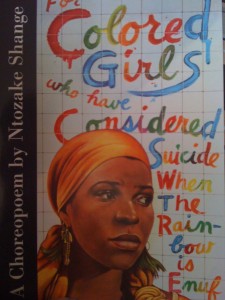 So many minority actresses auditioned for parts in the show that Theatre Conspiracy Producing Artistic Director Bill Taylor decided to cast eight actresses instead of the seven contemplated by the script.
So many minority actresses auditioned for parts in the show that Theatre Conspiracy Producing Artistic Director Bill Taylor decided to cast eight actresses instead of the seven contemplated by the script.
“Bill was surprised,” Marcus acknowledges. “He’d never seen so many minority actors turn out. He wanted to do [an all-minority production like For Colored Girls] for a long time, but didn’t know if he could get enough minority actors [to fill all the roles].”
According to Colon, it was a legitimate concern. There exist two separate, parallel theater communities in Southwest Florida and there is a perception that roles available to minority actors outside Dunbar are largely demeaning stereotypes like domestic workers, 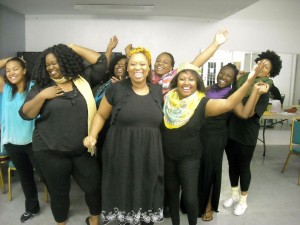 uneducated low-income workers and criminals. “Even at a place like Florida SouthWestern State College’s Black Box Theatre, the legacy of old black ‘Mammy’ performers still hangs over us. I hear complaints from actors and actresses all the time that there are no serious productions, no dramas, open to more serious actors.”
uneducated low-income workers and criminals. “Even at a place like Florida SouthWestern State College’s Black Box Theatre, the legacy of old black ‘Mammy’ performers still hangs over us. I hear complaints from actors and actresses all the time that there are no serious productions, no dramas, open to more serious actors.”
But the roles in For Colored Girls are pithy to the 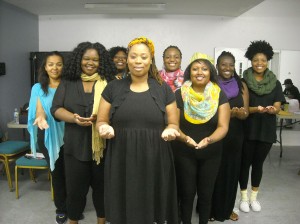 nth degree. “The poems are relevant to women today,” states Colon. “There’s still abuse, rape, philandering, and men who cannot commit. And I don’t think racism will ever go entirely away. But not being treated right by your husband or boyfriend is universal, and in this production, the poems are all told from a woman’s point of view. If people come with an open mind, what they see and hear will change their perspective.”
nth degree. “The poems are relevant to women today,” states Colon. “There’s still abuse, rape, philandering, and men who cannot commit. And I don’t think racism will ever go entirely away. But not being treated right by your husband or boyfriend is universal, and in this production, the poems are all told from a woman’s point of view. If people come with an open mind, what they see and hear will change their perspective.”
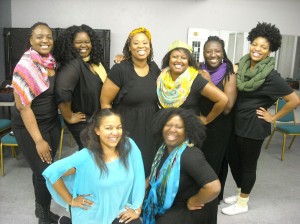 With a 40-year track record and numerous awards, Colon knows that For Colored Girls is a top-notch production and that the cast is strong and talented. What he doesn’t know is whether the local theater community will support an all-minority production that delves into serious themes and issues which might be perceived as disproportionately affecting minority women and
With a 40-year track record and numerous awards, Colon knows that For Colored Girls is a top-notch production and that the cast is strong and talented. What he doesn’t know is whether the local theater community will support an all-minority production that delves into serious themes and issues which might be perceived as disproportionately affecting minority women and 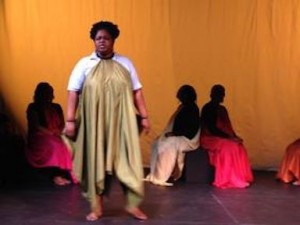 their men. “Even more worrisome than the fact that this is a minority play is that the majority of people in this area want to see romances and comedies,” Marcus notes. “They don’t want to think too much and this play makes you think and see women from a different point of view.”
their men. “Even more worrisome than the fact that this is a minority play is that the majority of people in this area want to see romances and comedies,” Marcus notes. “They don’t want to think too much and this play makes you think and see women from a different point of view.”
Bill Taylor shares Colon’s concerns about turn-out. “I hope that the residents and visitors of Southwest 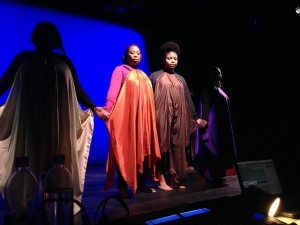 Florida will come out and support something like this,” he told Amy Tardiff in an interview that aired yesterday on WGCU radio. “It’s new. I don’t know of another show produced locally with this big a minority cast. I just hope it gets the support.”
Florida will come out and support something like this,” he told Amy Tardiff in an interview that aired yesterday on WGCU radio. “It’s new. I don’t know of another show produced locally with this big a minority cast. I just hope it gets the support.”
Colon does too. While he certainly wants the production to be successful for the sake of the cast and director Patricia Idlette, he has his eye on a bigger prize.
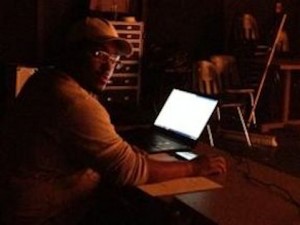 “If it is successful, people in the minority community might start seeing there’s another way out. That they don’t have to rap or play basketball to get out of the ghetto. They might say to themselves, ‘I always wanted to act or write stories.’ Well, perhaps they can take those stories, put them in a play and come out to a university or state college and learn how to write a play the correct way.”
“If it is successful, people in the minority community might start seeing there’s another way out. That they don’t have to rap or play basketball to get out of the ghetto. They might say to themselves, ‘I always wanted to act or write stories.’ Well, perhaps they can take those stories, put them in a play and come out to a university or state college and learn how to write a play the correct way.”
That’s what he’s doing, and he’d love to have company.
Marcus Jorel Colón is an actor, director and entertainer. His acting credits include Bob: A Life in Five Acts (at Laboratory Theater of Florida), Dead Man’s Cellphone (at Florid SouthWestern State College), Relatively Speaking (at Theatre Conspiracy), I Love You to Death (Starlight Productions), Vickie & Vinny’s Wedding (Starlight Productions) and It’s Not Worth It (Black Elixir Media). He has also produced and co-directed independent projects as The Storms At Home and Too Much Drama for the entertainment company he co-owns with his wife LaShanda Hutchins Colón. He is also a published poet, has worked on many short films, is a former theatre arts scholarship student at Florida SouthWestern State College and has taught acting at Thespian Production in Fort Myers.
Please see above for play dates, times and ticket information.
____________________________________________________________________
‘Colored Girls’ director Patricia Idlette shares insights into Theatre Conspiracy production (01-28-15)
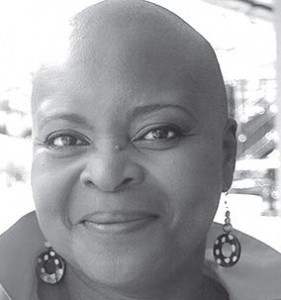 Theatre Conspiracy’s For Colored Girls Who Considered Suicide When the Rainbow is Enuf opens tonight at the Black Box Theatre on the campus of Florida SouthWestern State College. Written in 1975 by Ntozake Shange, the production has been described as a “choreopoem” that features a spellbinding collection of vivid prose and free verse narratives about and performed by black female actors that captures the brutal, tender and dramatic lives of contemporary black women.
Theatre Conspiracy’s For Colored Girls Who Considered Suicide When the Rainbow is Enuf opens tonight at the Black Box Theatre on the campus of Florida SouthWestern State College. Written in 1975 by Ntozake Shange, the production has been described as a “choreopoem” that features a spellbinding collection of vivid prose and free verse narratives about and performed by black female actors that captures the brutal, tender and dramatic lives of contemporary black women.
“The play was groundbreaking when it was written 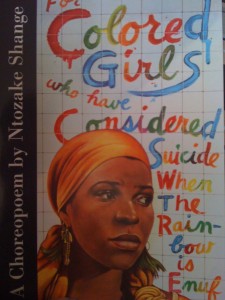 back in 1975,” points out director Patricia Idlette. “At the time, there were no black female voices in American theater. Ntozake Shange opened doors for black women to have a voice and some of the most prolific writers today are Black women.”
back in 1975,” points out director Patricia Idlette. “At the time, there were no black female voices in American theater. Ntozake Shange opened doors for black women to have a voice and some of the most prolific writers today are Black women.”
There were not a lot of serious African-American actresses when Idlette was growing up. In fact, there were not many black female characters on stage, in film or on television. “And those there were typically were light skinned,” Idlette adds. While great strides have been made in American theater, film and television, Idlette still laments that opportunities for people of color are limited in Southwest Florida. “As an equity member, I’m fortunate,” Patricia  remarks. “I can go anywhere and you pretty much have to go outside Southwest Florida for acting opportunities. But even so, I’m generally cast because I’m black.” She would prefer non-traditional, color-blind casting. “Why not educate as well as entertain?” she asks rhetorically. “After all, part of theater’s purpose is to be avant-garde.”
remarks. “I can go anywhere and you pretty much have to go outside Southwest Florida for acting opportunities. But even so, I’m generally cast because I’m black.” She would prefer non-traditional, color-blind casting. “Why not educate as well as entertain?” she asks rhetorically. “After all, part of theater’s purpose is to be avant-garde.”
The show is celebrating its 50th anniversary  this year, but the themes it presents still resonate with actors and audiences. “Who hasn’t had their heart broken because he’s seeing someone else? What woman hasn’t been asked to subjugate their desires or aspirations to his career goals? Of course, there are some enlightened males out there,” Patricia says hopefully. “But the whole Cole Porter thing of girl meets boy, girl loses boy, girl gets boy back is pretty universal.”
this year, but the themes it presents still resonate with actors and audiences. “Who hasn’t had their heart broken because he’s seeing someone else? What woman hasn’t been asked to subjugate their desires or aspirations to his career goals? Of course, there are some enlightened males out there,” Patricia says hopefully. “But the whole Cole Porter thing of girl meets boy, girl loses boy, girl gets boy back is pretty universal.”
 The play has been performed around the world, including less obvious venues such as Indonesia and Vietnam. “Women are trapped everywhere in abusive, powerless situations,” Patricia notes, adding reflectively that at least in the United States women can drive and go in public without the necessity of being accompanied by a male.
The play has been performed around the world, including less obvious venues such as Indonesia and Vietnam. “Women are trapped everywhere in abusive, powerless situations,” Patricia notes, adding reflectively that at least in the United States women can drive and go in public without the necessity of being accompanied by a male.
Idlette believes that the play has enjoyed such 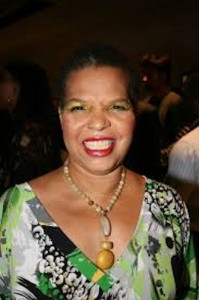 longevity because it is so genuine. “It’s a poem about how Ntozake (pictured right and below) found her own identity and voice by learning from the difficulties she experienced and overcoming the adversities she faced during her early life,” Idlette observes.
longevity because it is so genuine. “It’s a poem about how Ntozake (pictured right and below) found her own identity and voice by learning from the difficulties she experienced and overcoming the adversities she faced during her early life,” Idlette observes.
When Shange wrote For Colored Women, she included roles for seven female actors. “This production will feature eight disciplined, talented women,” Patricia states. Another change that the audience will see is a greater emphasis on dynamic movement, which makes for a more intimate, personal experience. “Earlier productions were dance oriented, but don’t expected choreographed dance numbers. The emphasis on movement better expresses the stream-of-consciousness aspect to the choreopoem.”
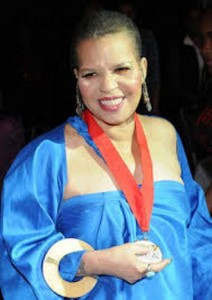 Patricia began her career at the prestigious Stratford Festival Canada as Phoebe in As You Like It and Medea in Medea, and has performed on numerous regional stages throughout the United States and Canada. Patricia has starred in several productions at the Florida Repertory Theater and was most recently seen on the Theatre Conspiracy stage playing 10 different characters in Shipwrecked! One of her favorite roles was Texas politician Barbara Jordan in Voice of Good Hope at the acclaimed BoardsHead Theatre. Patricia performed for two seasons with Vancouver’s Bard on the Beach, playing Paulina in The Winter’s Tale and Queen Margaret in Richard the III, and she played Clemma in Proposals at the Royal Alexandra Theatre in Toronto. Patricia’s film credits include Scary Movie 3, Man in the Mirror and Air Bud: World Pup, and she appeared for two seasons on the television show Dead Like Me and had recurring roles in Battlestar Galactica and Psych.
Patricia began her career at the prestigious Stratford Festival Canada as Phoebe in As You Like It and Medea in Medea, and has performed on numerous regional stages throughout the United States and Canada. Patricia has starred in several productions at the Florida Repertory Theater and was most recently seen on the Theatre Conspiracy stage playing 10 different characters in Shipwrecked! One of her favorite roles was Texas politician Barbara Jordan in Voice of Good Hope at the acclaimed BoardsHead Theatre. Patricia performed for two seasons with Vancouver’s Bard on the Beach, playing Paulina in The Winter’s Tale and Queen Margaret in Richard the III, and she played Clemma in Proposals at the Royal Alexandra Theatre in Toronto. Patricia’s film credits include Scary Movie 3, Man in the Mirror and Air Bud: World Pup, and she appeared for two seasons on the television show Dead Like Me and had recurring roles in Battlestar Galactica and Psych.
Please see above for play dates, times and ticket information.
_____________________________________________________________________
Lioness playwright Ntozake Shange draws heavily on experiences as black female in America in ‘For Colored Women’ (01-21-15)
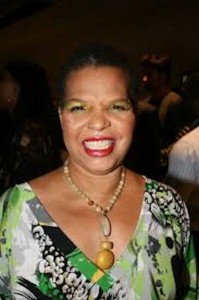 Theatre Conspiracy continues it’s 21st anniversary season with a production that was recently added to its season of shows. For Colored Girls Who Have Considered Suicide When the Rainbow Is Enuf by Ntozake Shange will play for eight performances only starting January 29.
Theatre Conspiracy continues it’s 21st anniversary season with a production that was recently added to its season of shows. For Colored Girls Who Have Considered Suicide When the Rainbow Is Enuf by Ntozake Shange will play for eight performances only starting January 29.
Ntozake Shange was born Paulette Williams, but while earning her master’s degree, she took the African name of Ntozake Shange, which translates as “she who comes with her own things” or she “who walks like a lion.” Although she earned both a bachelor’s and master’s degree in American Studies, her years at Barnard College and U.C.L.A. were difficult. Hurt and frustrated after separating from her first husband, 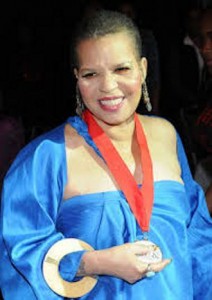 she attempted suicide several times before focusing her rage against the limitations society imposes on black women.
she attempted suicide several times before focusing her rage against the limitations society imposes on black women.
Using her angst as inspiration and motivation, Shange established and today maintains parallel careers as a writer, performer, and teacher. In the latter capacity, she is currently a Professor in the African American Studies Program and the Center for Women’s Studies and Gender Research at the University of Florida, but her teaching credits include stints at the University of California (1972-75), California State College (1973-1974), Sonoma Mills College (1975), and the University of Houston (1983-2001). In addition, she has served as a visiting professor at DePaul University, a visiting 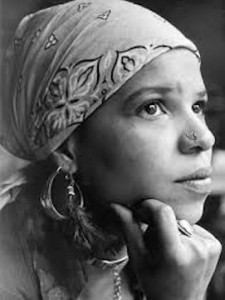 artist at Brown University, an artist in residence at New Jersey State Council on the Arts, and creative writing instructor at City College of New York, as well as a lecturer at Douglass College, Yale University, Howard University, the Detroit Institute of Arts, and New York University.
artist at Brown University, an artist in residence at New Jersey State Council on the Arts, and creative writing instructor at City College of New York, as well as a lecturer at Douglass College, Yale University, Howard University, the Detroit Institute of Arts, and New York University.
As a dancer, she has performed with Third World Collective, Raymond Sawyer’s Afro-American Dance Company, Sounds in Motion, West Coast Dance Works, and her own dance company, For Colored Girls Who Have Considered Suicide. She has appeared in Broadway and off-Broadway productions of her own plays, including For Colored Girls Who Have Considered Suicide 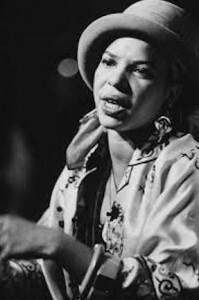 When the Rainbow Is Enuf and Where the Mississippi Meets the Amazon.
When the Rainbow Is Enuf and Where the Mississippi Meets the Amazon.
But Shange is most commonly associated with For Colored Girls Who Have Considered Suicide When the Rainbow Is Enuf. The play draws heavily on Shange’s experiences of being a black woman in America, and uses female dancers to dramatize poems that recall encounters with classmates, lovers, rapists, abortionists and latent killers. The women survive abuse and disappointment and come to recognize in each other the promise of a better future.
According to Washington Post theater critic Jacqueline Trescott, the 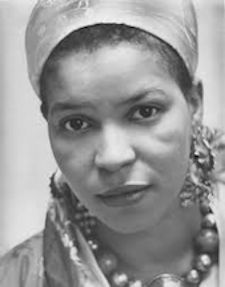 production “took the theatre world by storm.” Because its unique blend of poetry, music, dance and drama (called a choreopoem) broke with the traditional one-two-three act format commonly employed by her contemporaries, For Colored Girls “became an electrifying Broadway hit [that] provoked heated exchanges about the relationships between black men and women.” In fact, New York Times theater critic Mel Gussow called Shange “a pioneer in terms of her subject matter: the fury of black women at their double subjugation in white male America.”
production “took the theatre world by storm.” Because its unique blend of poetry, music, dance and drama (called a choreopoem) broke with the traditional one-two-three act format commonly employed by her contemporaries, For Colored Girls “became an electrifying Broadway hit [that] provoked heated exchanges about the relationships between black men and women.” In fact, New York Times theater critic Mel Gussow called Shange “a pioneer in terms of her subject matter: the fury of black women at their double subjugation in white male America.”
The play received both enthusiastic reviews and criticism for its 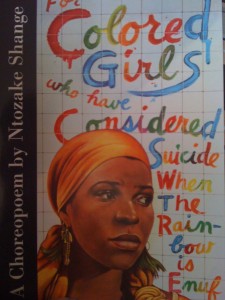 portrayal of African-American men. However, “Shange’s poems aren’t war cries,” Jack Kroll wrote in a Newsweek review of the Public Theatre production of For Colored Girls. “They’re outcries filled with a controlled passion against the brutality that blasts the lives of ‘colored girls’—a phrase that in her hands vibrates with social irony and poetic beauty. These poems are political in the deepest sense, but there’s no dogma, no sentimentality, no grinding of false mythic axes.”
portrayal of African-American men. However, “Shange’s poems aren’t war cries,” Jack Kroll wrote in a Newsweek review of the Public Theatre production of For Colored Girls. “They’re outcries filled with a controlled passion against the brutality that blasts the lives of ‘colored girls’—a phrase that in her hands vibrates with social irony and poetic beauty. These poems are political in the deepest sense, but there’s no dogma, no sentimentality, no grinding of false mythic axes.”
For Colored Girls Who Have Considered Suicide When the Rainbow Is Enuf will be performed in the Black Box Theatre at Florida Southwestern State College. Please see above for dates, times and ticket information.
_____________________________________________________________________
Academy Awards snub underscores need for productions geared toward minority actors, directors and designers (01-18-15)
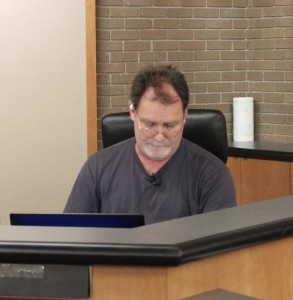 In announcing the addition of For Colored Girls Who Have Considered Suicide When the Rainbow is Enuf to Theatre Conspiracy’s 20142015 schedule, Producing Artistic Director Bill Taylor said, “We truly believe there is a need to produce shows that are geared toward minority artists in this area. If you look around there are not very many opportunities for minority actors, directors and designers. We hope to initiate a change in that.”
In announcing the addition of For Colored Girls Who Have Considered Suicide When the Rainbow is Enuf to Theatre Conspiracy’s 20142015 schedule, Producing Artistic Director Bill Taylor said, “We truly believe there is a need to produce shows that are geared toward minority artists in this area. If you look around there are not very many opportunities for minority actors, directors and designers. We hope to initiate a change in that.”
If the Academy Awards can be used as a litmus test, change is needed from the grassroots, community 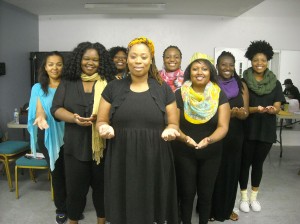 level all the way to Hollywood. This year’s slate of Oscar nominees is conspicuous for its lack of diversity in the acting and directing categories. In fact, 2015 marks the first time since 2011 that the 20 acting nominees were all white. Before that, 1998 was the last time the nominees were all white. The omission of black actors and directors is particularly curious given the critical acclaim that
level all the way to Hollywood. This year’s slate of Oscar nominees is conspicuous for its lack of diversity in the acting and directing categories. In fact, 2015 marks the first time since 2011 that the 20 acting nominees were all white. Before that, 1998 was the last time the nominees were all white. The omission of black actors and directors is particularly curious given the critical acclaim that 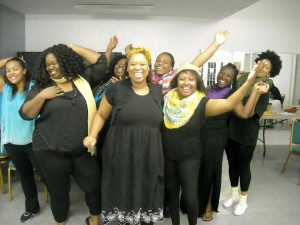 actor David Oyelowo and supporting actress Carmen Ejogo received for their work in Selma. Oyelowo was nominated for the Golden Globe and the Critics’ Choice, and his performance scored rave reviews. And the Academy chose to favor Meryl Streep with her 19th nomination over the impeccable work by Britain’s half-Nigerian/half Irish actress Carmen Ejogo.
actor David Oyelowo and supporting actress Carmen Ejogo received for their work in Selma. Oyelowo was nominated for the Golden Globe and the Critics’ Choice, and his performance scored rave reviews. And the Academy chose to favor Meryl Streep with her 19th nomination over the impeccable work by Britain’s half-Nigerian/half Irish actress Carmen Ejogo.
See above for dates, times and ticket information.
___________________________________________________________________
Spellbinding choreopoem ‘For Colored Girls’ coming to Florida Southwestern State College’s Black Box Theatre (01-17-15)
 Theatre Conspiracy continues it’s 21st anniversary season with a production that was recently added to its season of shows. For Colored Girls Who Have Considered Suicide When the Rainbow Is Enuf by Ntozake Shange will play for eight performances only starting January 29. The show will be performed at Florida Southwestern State College’s Black Box Theatre in Building L.
Theatre Conspiracy continues it’s 21st anniversary season with a production that was recently added to its season of shows. For Colored Girls Who Have Considered Suicide When the Rainbow Is Enuf by Ntozake Shange will play for eight performances only starting January 29. The show will be performed at Florida Southwestern State College’s Black Box Theatre in Building L.
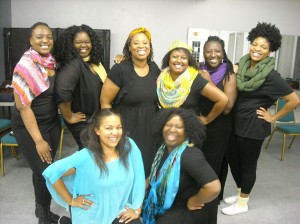 Directed by professional Equity actress Patricia Idlette, this groundbreaking “choreopoem” is a spellbinding collection of vivid prose and free verse narratives about and performed by Black women. Capturing the brutal, tender and dramatic lives of contemporary Black women, For Colored Girls offers a transformative, riveting evening of provocative dance, music and poetry.
Directed by professional Equity actress Patricia Idlette, this groundbreaking “choreopoem” is a spellbinding collection of vivid prose and free verse narratives about and performed by Black women. Capturing the brutal, tender and dramatic lives of contemporary Black women, For Colored Girls offers a transformative, riveting evening of provocative dance, music and poetry.
 “This production represents a new initiative for Theatre Conspiracy,” states Producing Artistic Director Bill Taylor. “We truly believe there is a need to produce shows that are geared toward minority artists in this area. If you look around there are not very many opportunities for minority actors, directors and designers. We hope to initiate a change in that.”
“This production represents a new initiative for Theatre Conspiracy,” states Producing Artistic Director Bill Taylor. “We truly believe there is a need to produce shows that are geared toward minority artists in this area. If you look around there are not very many opportunities for minority actors, directors and designers. We hope to initiate a change in that.”
The cast consists of local actresses Sonya McCarter, Biscelgia Scott, Sharetha Davis, Paige Dawkins, RaQukerria Farmer, Chejia Onumbu, Monica DeLattorre, Anna Delevoe, Carolyn Greene, Cantrella Canady, Mellissa Sanon and Witline Joseph.
For Colored Girls… was the winner of the 1977 Obie Award for Distinguished Production. The New York Daily News called it “a triumphant event, filled with humor; pure theatre,” with Time labeling the production “a poignant, gripping, angry and beautiful work.”














 Tom Hall is both an amateur artist and aspiring novelist who writes art quest thrillers. He is in the final stages of completing his debut novel titled "Art Detective," a story that fictionalizes the discovery of the fabled billion-dollar Impressionist collection of Parisian art dealer Josse Bernheim-Jeune, thought by many to have perished during World War II when the collection's hiding place, Castle de Rastignac in southern France, was destroyed by the Wehrmacht in reprisal for attacks made by members of the Resistance operating in the area. A former tax attorney, Tom holds a bachelor's degree as well as both a juris doctorate and masters of laws in taxation from the University of Florida. Tom lives in Estero, Florida with his fiancee, Connie, and their four cats.
Tom Hall is both an amateur artist and aspiring novelist who writes art quest thrillers. He is in the final stages of completing his debut novel titled "Art Detective," a story that fictionalizes the discovery of the fabled billion-dollar Impressionist collection of Parisian art dealer Josse Bernheim-Jeune, thought by many to have perished during World War II when the collection's hiding place, Castle de Rastignac in southern France, was destroyed by the Wehrmacht in reprisal for attacks made by members of the Resistance operating in the area. A former tax attorney, Tom holds a bachelor's degree as well as both a juris doctorate and masters of laws in taxation from the University of Florida. Tom lives in Estero, Florida with his fiancee, Connie, and their four cats.